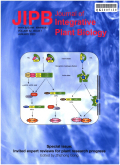- 钛学术文献服务平台 \
- 学术期刊 \
- 基础科学期刊 \
- 生物科学期刊 \
- 植物学报(英文版)期刊 \
TRAF proteins as key regulators of plant development and stress responses
TRAF proteins as key regulators of plant development and stress responses
基本信息来源于合作网站,原文需代理用户跳转至来源网站获取
摘要:
Tumor necrosis factor receptor-associated factor (TRAF) proteins are conserved in higher eukaryotes and play key roles in transducing cellular signals across different organelles.They are characterized by their C-terminal region(TRAF-C domain) containing seven to eight anti-parallel β-sheets,also known as the meprin and TRAF-C homology (MATH) domain.Over the past few decades,significant progress has been made toward understanding the diverse roles of TRAF proteins in mammals and plants.Compared to other eukaryotic species,the Ara-bidopsis thaliana and rice (Oryza sativa) ge-nomes encode many more TRAF/MATH domain-containing proteins;these plant proteins cluster into five classes:TRAF/MATH-only,MATH-BPM,MATH-UBP (ubiquitin protease),Seven in ab-sentia (SINA),and MATH-Filament and MATH-PEARLI-4 proteins,suggesting parallel evolution of TRAF proteins in plants.Increasing evidence now indicates that plant TRAF proteins form central signaling networks essential for multiple biological processes,such as vegetative and reproductive development,autophagosome formation,plant immunity,symbiosis,phyto-hormone signaling,and abiotic stress responses.Here,we summarize recent ad-vances and highlight future prospects for un-derstanding on the molecular mechanisms by which TRAF proteins act in plant development and stress responses.

推荐文章
Stress-XP重音理论与汉语三大特殊句式分析
句子重音
Stress-XP理论
汉语特殊句式
最大投射
S/Key协议的分析与改进
S/Key
身份认证
一次性口令
基于指纹加密保护的USB Key安全方案
USB Key
指纹加密
信息安全
基于Plant Simulation的离散制造系统仿真研究
离散制造系统
建模仿真
系统仿真
仿真模型
内容分析
关键词云
关键词热度
相关文献总数
(/次)
(/年)
引文网络
引文网络
二级参考文献 (0)
共引文献 (0)
参考文献 (0)
节点文献
引证文献 (0)
同被引文献 (0)
二级引证文献 (0)
2022(0)
- 参考文献(0)
- 二级参考文献(0)
- 引证文献(0)
- 二级引证文献(0)
引文网络交叉学科
相关学者/机构
期刊影响力
植物学报(英文版)
主办单位:
中国植物学会
出版周期:
月刊
ISSN:
1672-9072
CN:
11-5067/Q
开本:
大16开
出版地:
北京香山南辛村20号中科院植物所内
邮发代号:
2-500
创刊时间:
1952
语种:
eng
出版文献量(篇)
3621
总下载数(次)
1
总被引数(次)
74646
期刊文献
相关文献
推荐文献
- 期刊分类
- 期刊(年)
- 期刊(期)
- 期刊推荐
力学
化学
地球物理学
地质学
基础科学综合
大学学报
天文学
天文学、地球科学
数学
气象学
海洋学
物理学
生物学
生物科学
自然地理学和测绘学
自然科学总论
自然科学理论与方法
资源科学
非线性科学与系统科学
植物学报(英文版)2022
植物学报(英文版)2021
植物学报(英文版)2020
植物学报(英文版)2019
植物学报(英文版)2018
植物学报(英文版)2017
植物学报(英文版)2016
植物学报(英文版)2015
植物学报(英文版)2014
植物学报(英文版)2013
植物学报(英文版)2012
植物学报(英文版)2011
植物学报(英文版)2010
植物学报(英文版)2009
植物学报(英文版)2008
植物学报(英文版)2007
植物学报(英文版)2006
植物学报(英文版)2005
植物学报(英文版)2004
植物学报(英文版)2003
植物学报(英文版)2002
植物学报(英文版)2001
植物学报(英文版)2000
植物学报(英文版)1999
植物学报(英文版)1998

 免费查重
免费查重










